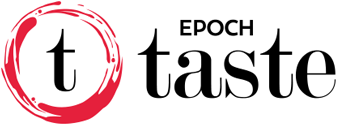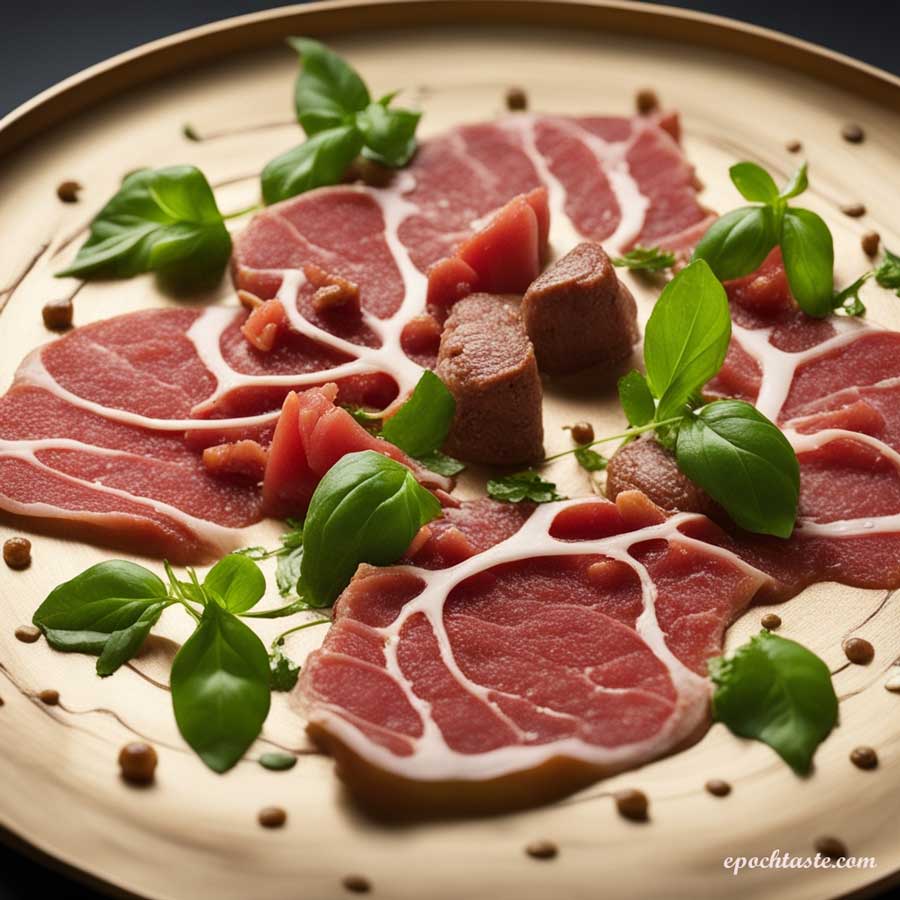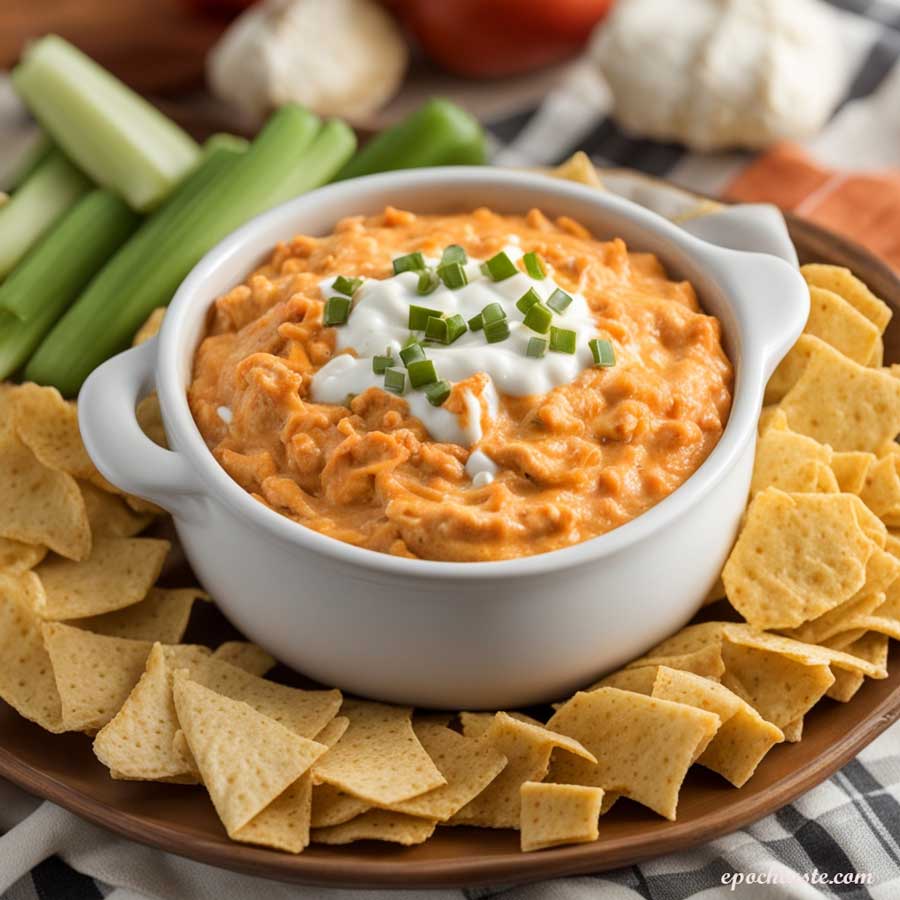Potatoes are an integral part of many cuisines around the world. In this blog post, we’ll delve into the intriguing world of “German for Potato,” exploring German potato words, translations, pronunciations, and even how you can learn potato-related vocabulary on Duolingo. We’ll also touch on other interesting terms like “mashed potato in German,” “tomato in German,” and the German word for potato pancakes.
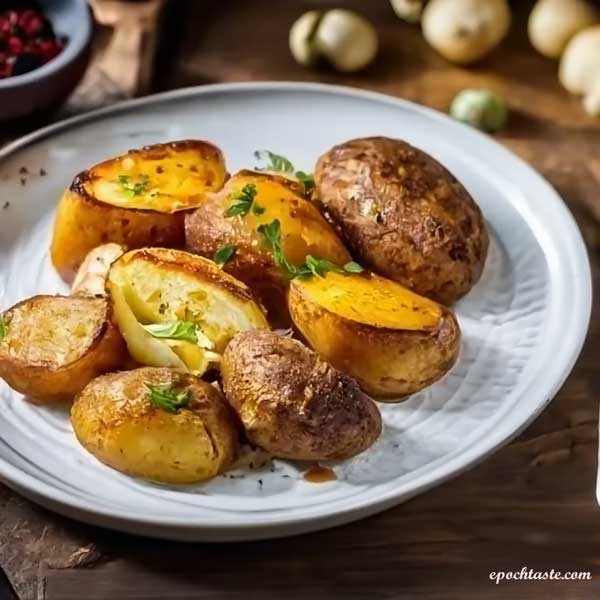
Chapter 1: The Basics – German for Potato Words
Let’s begin our journey into the world of “German for Potato” by exploring the fundamental German words related to potatoes. Potatoes hold a special place in German cuisine, so it’s essential to start with the basics. In the German language, potatoes are referred to as “Kartoffeln.” This simple term serves as the gateway to a myriad of culinary delights and cultural traditions. Understanding this word is key to unlocking the richness of German food culture.
Potatoes have played a significant role in German history and continue to be a staple in the modern German diet. The versatility of this humble tuber is reflected in the various dishes it inspires, from hearty potato soups to crispy potato pancakes. “Kartoffeln” is a word you’ll encounter frequently when exploring German food, so remember it well as you embark on your potato-themed linguistic adventure.
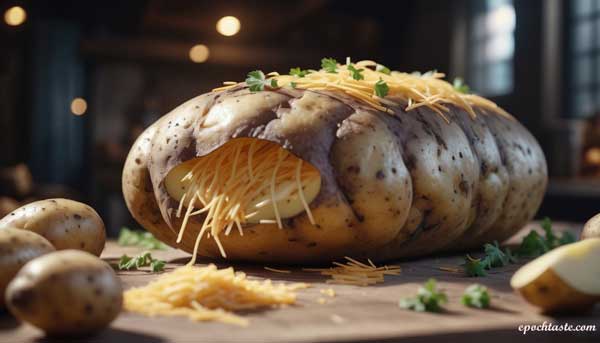
Chapter 2: German for Potato Translation
Now that we’ve established the fundamental German word for “potato” as “Kartoffeln,” it’s time to delve deeper into the world of “German for Potato” by exploring some essential translations. Understanding how to describe different potato dishes or ask for your favorite potato-based meal when traveling in Germany is vital for a rewarding culinary experience.
- Potato Salad (Kartoffelsalat): One of the most iconic potato dishes in Germany is “Kartoffelsalat,” which translates to “potato salad” in English. German potato salad is a popular side dish, often served warm with a tangy vinegar and bacon dressing. It varies by region, with southern Germany favoring a broth-based salad and the northern regions opting for a mayonnaise-based version.
- French Fries (Pommes Frites): If you’re a fan of the crispy goodness of french fries, you’ll be pleased to know that they are referred to as “Pommes Frites” in German. The term is widely recognized in Germany, making it easy for you to satisfy your craving for these delicious fried potato sticks.
- Roasted Potatoes (Bratkartoffeln): For those who enjoy the savory delight of roasted potatoes, the German term is “Bratkartoffeln.” These are typically thinly sliced potatoes, seasoned and fried to perfection, creating a flavorful and satisfying accompaniment to various German dishes.
These translations are essential for navigating menus in German restaurants or when shopping for ingredients to create your own potato-based masterpieces. Whether you’re a fan of potato salad, french fries, or roasted potatoes, knowing the German translations will ensure you don’t miss out on these delightful culinary experiences during your visit to Germany.
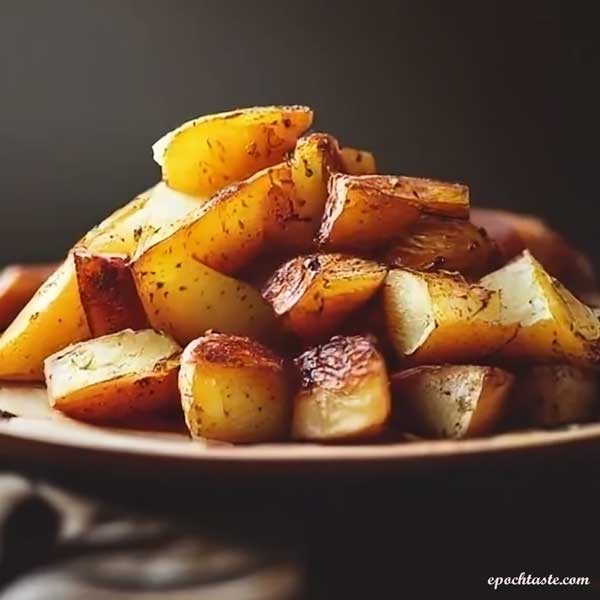
Chapter 3: German for Potato Pronunciation
Understanding how to pronounce potato-related words in German is crucial for effective communication and enhancing your language skills. Let’s explore the pronunciation of some key terms related to “German for Potato.”
- Kartoffeln (kar-toh-feln): The German word for “potato,” “Kartoffeln,” is pronounced with a soft ‘k’ and a clear ‘a’ sound. The ‘r’ is rolled slightly, and the final ‘n’ is enunciated softly. It’s a straightforward word to pronounce once you get the hang of it. Say it as “kar-toh-feln.”
- Kartoffelsalat (kar-toh-fel-sah-laht): For “potato salad,” the pronunciation remains similar to “Kartoffeln.” The ‘s’ is pronounced like a ‘z,’ and the ‘t’ and ‘l’ sounds follow each other naturally. Say it as “kar-toh-fel-sah-laht.”
- Pommes Frites (poh-mes freet-es): “Pommes Frites” is the German term for “French fries.” The ‘p’ is pronounced like a ‘poh’ with a short ‘o’ sound, and “Frites” is pronounced as “freet-es.” Practice the ‘r’ and ‘f’ sounds to get the pronunciation just right. Say it as “poh-mes freet-es.”
- Bratkartoffeln (braht-kar-toh-feln): When it comes to “roasted potatoes,” remember that ‘brat’ is pronounced with a clear ‘a’ sound and ‘t’ as ‘t.’ The rest of the word, “kartoffeln,” follows the same pronunciation as mentioned earlier. Say it as “braht-kar-toh-feln.”
Practice these pronunciations regularly to build confidence in using these terms while ordering your favorite potato dishes or engaging in conversations about German cuisine. The better you master the pronunciation, the more enjoyable your culinary experiences in Germany will be.
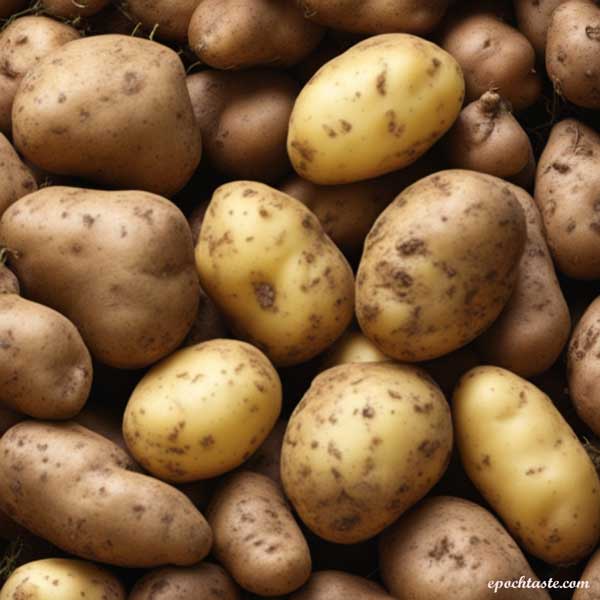
Chapter 4: German for Potato in English
As we continue our exploration of “German for Potato,” let’s shift our focus to the influence of English terms related to potatoes in the German language. You’ll be surprised to find out how often English potato-related words are used and recognized in Germany. Here are a few examples:
- Potato Chips: In Germany, you can find potato chips, often referred to as simply “Chips.” The term “potato chips” itself is widely used in the German language, making it easy to satisfy your snack cravings with a familiar term.
- Potato Wedges: These thick-cut potato pieces, often seasoned and baked to perfection, are known as “Wedges” in German. The term “Wedges” is borrowed directly from English, making it easy for English speakers to order this popular side dish.
- Baked Potato (Ofenkartoffel): The term “Baked Potato” is also widely recognized in Germany. When you order a baked potato in a German restaurant, you can ask for an “Ofenkartoffel,” which literally translates to “oven potato.”
The influence of the English language in the culinary world has resulted in a delightful blend of potato-related terms that can make your dining experiences in Germany quite comfortable. You’ll find that many English words have seamlessly integrated into the German language, simplifying the ordering process and enhancing your culinary adventures. So, don’t be surprised if you see these familiar English terms when exploring potato-based dishes in Germany.
Chapter 5: Potato-Related Vocabulary on Duolingo
Learning a new language, including essential food-related vocabulary, has become more accessible than ever, thanks to language learning apps like Duolingo. If you’re eager to enhance your “German for Potato” skills, Duolingo provides a convenient and effective way to do so. Here’s how you can explore potato-related terms on the platform:
- Duolingo Lessons: Duolingo offers comprehensive lessons covering various topics, including food. In these lessons, you’ll find dedicated sections that delve into different food items, including potatoes. By completing these lessons, you’ll learn essential vocabulary, phrases, and even sentence structures related to potatoes and other foods.
- Practice Phrases: Duolingo includes practice phrases that help you apply what you’ve learned. You can practice saying things like “I want potatoes” or “Potatoes are delicious” in German. These exercises reinforce your understanding of potato-related vocabulary and help you build your conversational skills.
- Flashcards: Duolingo’s flashcards feature is a handy tool for memorizing vocabulary. You can create custom flashcards with potato-related words and phrases, ensuring that you retain and recall them more easily. Whether it’s “Kartoffeln” (potatoes) or “Kartoffelsalat” (potato salad), flashcards can aid your learning.
- Duolingo Stories: Duolingo Stories are engaging narratives that help you learn languages in context. You may come across stories that involve ordering potato dishes at a restaurant, cooking potatoes at home, or experiencing cultural aspects related to potatoes. These stories allow you to see and hear how potato-related vocabulary is used in real-life situations, making your learning more immersive and practical.
Duolingo’s user-friendly platform is designed to make language learning enjoyable and effective. By exploring the various features it offers, you can master “German for Potato” and other related vocabulary with ease. So, whether you’re a beginner looking to expand your language skills or a seasoned learner seeking to enhance your knowledge, Duolingo is a valuable resource for all your language learning needs.
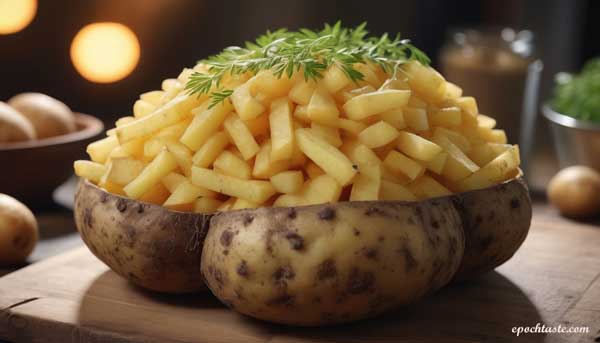
Chapter 6: Mashed Potato in German
If you’re a fan of mashed potatoes, you’ll be pleased to know that these creamy delights have their own name in the German language. In German, mashed potatoes are known as “Kartoffelpüree.” This term beautifully captures the essence of this beloved comfort food.
“Kartoffelpüree” is a popular side dish in Germany, just as it is in many other parts of the world. The dish is made by boiling and mashing potatoes, often incorporating butter, milk, and seasoning to achieve a smooth and creamy texture. It’s the perfect accompaniment to various German meat dishes, such as schnitzel or bratwurst, and complements gravies and sauces perfectly.
The process of making “Kartoffelpüree” is similar to how mashed potatoes are prepared in other cultures, but the name is distinctly German. Whether you’re enjoying a home-cooked meal or dining at a German restaurant, don’t miss the opportunity to savor “Kartoffelpüree” and experience the delightful creaminess of mashed potatoes with a German twist.
Chapter 7: Tomato in German
As we continue our linguistic journey, it’s worth exploring the term for “tomato” in the German language. In German, a tomato is simply called “Tomate.” The pronunciation is similar to the English word, making it easy for English speakers to recognize and use when discussing this versatile fruit.
“Tomate” is a commonly used word in the German language, especially in the context of cooking, salads, and various dishes. Tomatoes are a staple ingredient in many German recipes, from hearty stews to fresh and vibrant salads. Knowing the German word for “tomato” can be quite helpful when you’re shopping for groceries, following a German recipe, or dining in a German restaurant.
So, whether you’re a tomato enthusiast looking to make a delicious tomato-based dish or simply want to enhance your German language skills, “Tomate” is a word you’ll encounter frequently as you explore the rich and diverse world of German cuisine.
Chapter 8: German Word for Potato Pancakes
Potato pancakes are a beloved comfort food in many cultures, and Germany is no exception. In the German language, potato pancakes are known by two distinct names: “Kartoffelpuffer” and “Reibekuchen.” These delicious fried treats are often served with applesauce or sour cream, adding a delightful contrast to the crispy texture of the pancakes.
- Kartoffelpuffer: This is one of the most commonly used terms for potato pancakes in Germany. The word “Kartoffelpuffer” breaks down to “Kartoffel” (potato) and “Puffer” (puffer or buffer). These pancakes are created by grating potatoes, mixing them with ingredients like eggs and flour, and then frying them until they are crispy and golden brown. They are a popular snack, side dish, or even a main course, depending on the occasion.
- Reibekuchen: The term “Reibekuchen” is also used to refer to potato pancakes, particularly in certain regions of Germany. “Reiben” means to grate, and “Kuchen” means cake, so “Reibekuchen” essentially means “grated potato cake.” These pancakes are made by grating potatoes and adding various seasonings, and they are usually served with applesauce.
The choice between “Kartoffelpuffer” and “Reibekuchen” may vary depending on the region in Germany, but both terms are commonly understood and used throughout the country. These tasty potato creations are a delicious and comforting dish, often enjoyed with family and friends, making them an essential part of German culinary traditions.
Conclusion
In this potato-themed journey through the German language, we’ve explored everything from the basic “German for potato words” to translations, pronunciation, and even the influence of English in German culinary vocabulary. We’ve also touched on learning potato-related terms through Duolingo, discovered “mashed potato in German,” learned the word for “tomato” in German, and even found out the name for potato pancakes in the language.
By mastering these potato-related terms, you’ll not only enhance your language skills but also your culinary adventures in Germany. So, the next time you visit a German restaurant or try your hand at cooking a traditional German dish, you’ll be well-equipped to navigate the world of potatoes in the German language. Guten Appetit!
